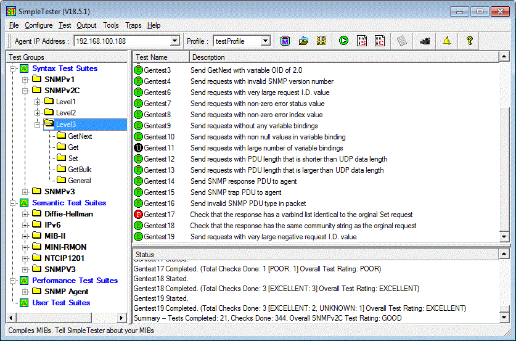Overview
SNMP managers and agents can communicate with one another because they share a common understanding of the data being exchanged (MIBs) and use the same mechanism to exchange that data (SNMP protocol). Hence, to ensure interoperability, an agent must be tested to check if its data matches the MIB definition, and if it adheres to the data exchange mechanisms
(Get/GetNext/Set/GetBulk operations) specified in the SNMP protocol.
The SimpleTester™ is the industry leading SNMP test tool that automatically exercises SNMP v1, v2C, and v3 agents. All types of SNMP Agents (standalone, proxies, sub-agents) implementing one or more standard, experimental or private MIBs can be exhaustively tested, within minutes.

Operation
A few simple steps are required to start an Agent. They are:
- Use the built-in MIB compiler to load the MIBs supported by the Agent.
- Use the built-in MIB walker to specify the variables to be tested.
- Run any or all of the predefined tests to check for conformance with the MIB definitions and SNMP specifications. The detailed reports pinpoint problem areas.
- Use the built-in Script Generator and RowStatus Tester to automatically create test scripts and the built-in Script Runner to run these scripts for load and regression testing.
- Optionally use the built-in Semantics checker to check the implementation of popular MIBs.

As the number of MIBs, MIB variables and instances supported by an SNMP agent grows, it can take weeks or even months to manually test each variable using tools like a typical MIB Browser. This is where the SimpleTester is most useful. The SimpleTester is an “SNMP Expert” program that will intelligently interpret MIB files, SNMP protocol specifications, and all the MIB objects supported by the agent. Using this knowledge, it automates the testing process to complete weeks worth of manual testing – in just minutes.
The SimpleTester contains syntax tests, semantic tests, performance tests, and other utilities.
The predefined syntax tests check for MIB and SNMP protocol compliance for any MIB by sending hundreds of different Get/GetNext/Set/GetBulk requests and analyzing the response for each and every MIB object supported by the agent. With each test result, reference is given to the RFC which specifies the behavior being tested.
The semantic tests include over 1100 tests to validate the semantics of popular MIBs like MIB-II, RMON, SNMPv3, and the NTCIP Global Objects MIB. These tests further ensure that the agent has implemented the behavior of each MIB object properly. For example, in MIB-II if 2000 octets are sent to the agent, its ifInOctets for the corresponding interface should at least increment by that amount. The tests can be easily customized by making changes to configuration files. In addition, the source code of all the 1100+ tcl scripts is also available for perusal. The framework is also fully documented to allow users to easily add their own test suites.
The performance tests measure the agent’s ability to handle a stream of requests, one after another, and its ability to handle a set of requests all at once. With these tests the SimpleTester is measuring response times and creates a report which indicates the shortest, the longest, and the average response time given the number of messages sent and received.
The test suite structure support is fully extensible. Users can develop and add their own semantic test suites using the test suite builder which has a very easy to use graphical user interface.
The built-in Tcl interpretor has support for SNMP, Telnet, Serial I/O, as well as the Simple Transportation Management Protocol (STMP), to allow users to define their own scripts that test other aspects of the device including its Command Line Interface (CLI).
The SimpleTester includes a MIB Browser that graphically displays the object registration tree and allows the retrieval and setting of manageable objects.
In addition to the user interface, the SimpleTester can also be run in an unattended mode by specifying the tests to be conducted in a command file.
SimpleTester also includes support for Diffie-Hellman Key Change and Key Ignition. Ability to create random numbers and their corresponding keys is also available. This functionality is particularly useful within the Cable Modem industry implementing the DOCSIS 1.1 specifications.
Features
- Supports IPv4 and IPv6.
- Communicates through both UDP datagrams and TCP connections over the standard network interface.
- Checks MIBs (v1 and v2 SMI) for Syntax Errors.
- Checks agent responses (and traps) for conformance with the associated MIBs.
- Checks agent for compliance with the SNMP protocol specification (SNMPv1, v2C and v3)
- Automatically tests each MIB variable for get, getnext, getbulk and set operations.
- Supports the Posix test results as defined in IEEE std 2003-1997.
- Includes over 1100 semantic tests for popular MIBs like MIB-II, RMON and SNMPv3 with source code.
- Creates script files to be used for regression, load and “RowStatus” related testing.
- Provides detailed reports that pinpoint problems.
- Includes Tcl interpreter and SNMP, Telnet, Serial I/O, STMP Tcl commands for custom script development.
- Contains a simple MIB Browser that graphically displays the MIB structure.
- Supports MD5, SHA, DES, for standard SNMPv3 authentication and privacy.
- Support for 3DES, as well as AES with 128, 192, and 256 key lengths, only available with AES version.
- Support for SHA2 with key lengths of 128 (uses SHA-224), 192 (uses SHA-256), 256 (uses SHA-384), and 384 (uses SHA-512), only available with AES version.
- Includes support for Diffie-Hellman Key Change and Key Ignition.
- Supports functionality to include user defined test suites.
- Includes a test suite builder to ease the burden of creating and organizing user defined test suites.(Windows version)
- Supports both hardware andsoftware based licensing schemes.
- Simple, intuitive, easy to use interface that runs on a PC.
- Includes the ASN.1 version of the NTCIP MIBs and also precompiled files of all those MIBs so that all that will need to be done is to add a device’s manufacturer specific MIBs to the compile file.
- Test Suites Included
- Complete Syntax Test Suites for Any MIB:
- Standard IETF MIBs, Experimental MIBs, or Proprietary MIBs.
- MIB-II Semantic Test Suite
- RMON Semantic Test Suite
- SNMPv3 Semantic Test Suite
- Diffie-Hellman Semantic Test Suite
Test Suites Included
- Complete Syntax Test Suites for Any MIB:
- Standard IETF MIBs, Experimental MIBs, or Proprietary MIBs.
- MIB-II Semantic Test Suite
- RMON Semantic Test Suite
- SNMPv3 Semantic Test Suite
- Diffie-Hellman Semantic Test Suite
- IPv6 Semantic Test Suite
- NTCIP Global Objects MIB (1201) Semantic Test Suite
- Performance Test Suite
Additional Test Suites Available
- SAN Test Suite
- DOCSIS 1.1 Test Suites for CM and CMTS
- DOCSIS 2.0 Test Suites for CM and CMTS
Supported IETF RFC’s
SNMPv1
- RFC 1157 - Simple Network Management Protocol
- RFC 1155 - Structure of Management Information
- RFC 1212 - Concise MIB Definitions
SNMPv2
- RFC 1901 - Community-based SNMPv2
- RFC 3416 - Protocol Operations for SNMPv2
- RFC 3417 - Transport Mappings for SNMP
- RFC 1908 - SNMPv1 and SNMPv2 Coexistence
SNMPv2 Data Definition
- RFC 2578 - Structure of Management Information
- RFC 2579 - Textual Conventions
- RFC 2580 - Conformance Statements
SNMPv3
- RFC 3411 - Architecture for SNMP Frameworks
- RFC 3412 - Message Processing and Dispatching
- RFC 3413 - SNMPv3 Applications
- RFC 3414 - User-based Security Model
- RFC 3415 - View-based Access Control Model
MIBs
- RFC 1213 - Management Information Base II
- RFC 1757 - Remote Network Monitoring MIB
- RFC 3418 - MIB for SNMP
- RFC 1573 - Evolution of the Interfaces Group of MIB-II
- RFC 2011 - Internet Protocol MIB
- RFC 2012 - Transmission Control Protocol MIB
- RFC 2013 - User Datagram Protocol MIB
Authentication/Privacy
- RFC 1321 - MD5 Message-Digest Algorithm
- RFC 2104 - HMAC: Keyed-Hashing for Message Authentication
- RFC 2786 - Diffie-Helman USM Key
Hardware and Software Requirements
The SimpleTester is supported on the following:
- Microsoft Windows 7/8/10/2008/2012
- RedHat Enterprise Linux (5.x, 6.x, 7.x)
Product Family
SimpleSoft provides a whole family of SNMP Agent testers to ensure that as your agent complexity and testing requirements grow, SimpleTester solutions grow with it. The smooth upgrade path also minimizes the need for retraining and learning a new and different test tools. As your test environment grows, individual testers familiar with SimpleTester will find it straight-forward to migrate to the SimpleTesterPro and carry out additional vulnerability testing. Test departments with many test engineers can migrate to using the floating license to carry out SNMP testing, by using a license server-based solution.
Current Users Include
More than 250 networking companies including CableLabs, Cisco, Nortel, Lucent, 3Com, Alcatel, Nokia, HP, TI, Fujitsu, Ericsson, and Deutsche Telekom.
History
Back in 1994, some of the openly available ISODE 8.0/SNMPv2 software distributions included a number of Tcl based test scripts to check for SNMP MIB and protocol compliance. But the process of getting the dependent software packages (BLT,ISODE, Tcl/Tk) and compiling them was fairly long and cumbersome and required gigabytes of space as well as a good understanding of the UNIX operating system. The test suite was also only available on UNIX.
Realizing the ubiquity of PCs, SimpleSoft created the first commercially available Microsoft Windows 3.1 based automated SNMP agent tester (SimpleTester). It was written in C, easy to use, and included some of the tests in the openly available package augmented with script generation and trap checking capabilities. The shrink-wrap product required only a few megabytes of space and could be used out-of-the-box. This made the test engineers productive very quickly without requiring them to be UNIX gurus.
SimpleTester’s ease of use soon made it a popular SNMP tester on hundreds of PCs in testing labs all around the world and its popularity continues to grow with every passing day.
SimpleSoft Agent Tester Overview
This short tutorial will give you an overview of SimpleSoft’s Automated SNMP Agent Tester which can complete weeks worth of manual testing in minutes.

SimpleSoft - an Industry Leader
Resources
- Video
- Product Updates
- Blogs
- White Paper
SimpleSoft Network Simulator Overview
SimpleSoft Agent Tester Overview
SimpleSoft SimpleIoTSimulator Overview
SimpleSoft releases Version 27.5 of SimpleAgentPro/Enterprise
SimpleAgentPro/Enterprise 27.5 now GetBulk based, faster learning, include file support in Telnet modeling files to reduce duplication, automatic handling of filters in Cisco IOS CLI commands,…
Release Notes
December 20, 2023
SimpleSoft releases Version 27.0 of SimpleAgentPro/Enterprise
SimpleAgentPro/Enterprise 27.0 now supports common data representation of variables for use by many management protocols, saving of configuration command information during CLI provisioning, simplified GPB buffer specification for Telemetry, Modeling file debugger,…
Release Notes
June 29, 2023
SimpleSoft releases Version 26.5 of SimpleAgentPro/Enterprise
SimpleAgentPro/Enterprise 26.5 now supports performance statistics in Netconf, provides remote host/port information in Telnet/SSH for filtering, allows timer_action to be staggered in SNMP,…
Release Notes
December 20, 2022
SimpleSoft releases Version 26.0 of SimpleAgentPro/Enterprise
SimpleAgentPro/Enterprise 26.0 now enhances Telemetry support in HTTP2/client and HTTP2, adds valuelist support in Netconf data modeling, AES-192-C and AES-256-C support for Cisco key initialization in SNMP,…
Release Notes
July 29, 2022
SimpleSoft releases Version 25.5 of SimpleAgentPro/Enterprise
SimpleAgentPro/Enterprise 25.5 now adds enhanced Netconf support for data modeling and namespaces, improved Telnet config command score handling, HTTP/2 server response generation without data,…
Release Notes
December 14, 2021
SimpleSoft releases Version 25.0 of SimpleAgentPro/Enterprise
SimpleAgentPro/Enterprise 25.0 now includes support for HTTP/2 client for dial-out telemetry with gRPC, exporting and importing of maps, device diagnostic connectivity checking, support for a config command score to give different show command responses after config changes in Telnet/SSH,…
Release Notes
July 27, 2021










